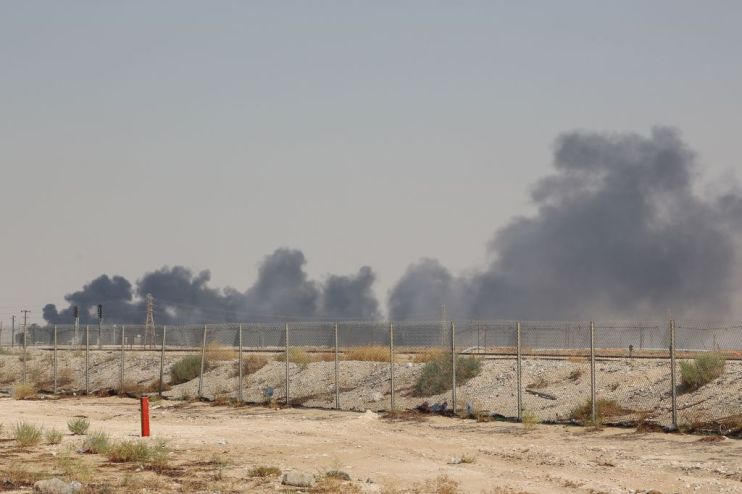Oil prices post record jump after attack on Saudi Arabia supplies

Oil prices rocketed almost 20 per cent to more than $71 a barrel today after the US accused Iran of gutting half of Saudi Arabia’s oil production in a strike on two refineries over the weekend.
Brent crude trimmed its record-breaking gains but its price still blew up 10.5 per cent to $66.56. World (WTI) crude rose a staggering 9.2 per cent to $59.89.
Read more: US blames Iran for drone strikes on Saudi oil sites
US secretary of state Mike Pompeo pointed the finger at Iran yesterday for “an unprecedented attack on the world’s energy supply”.
The attack, which Iran denies responsibility for, took out half of the kingdom’s oil supply – equivalent to 5.7m barrels per day – to send oil prices spiking.
Ten drones hit Saudi Arabia’s Abqaiq facility – the world’s biggest crude processing site – and the kingdom’s second biggest oil field in Khurais.
Iran warned that it was ready for war, adding that US military bases within a range of 2,000km could be targeted with missiles.
US President Donald Trump, meanwhile, said the US is “locked and loaded depending on verification” that Iran did orchestrate the attack.
He also approved the release of oil belonging to the nation’s emergency reserves.
The Saudis cannot restore full production for weeks, according to sources speaking to Bloomberg. If so Saudi Aramco could be unable to deliver on international shipment contracts.
“The attack was as severe as it was unexpected but that’s not the worst thing about it,” Craig Erlam, senior EMEA market analyst at Oanda, said.
“Saudi Arabia believes a significant proportion of the outages can be back online in a few days while Trump also approved release of supplies from the Strategic Petroleum Reserve to ensure the market remains well surprised.
“None of this should make us feel relaxed about the potential for further attacks though and the longer-term implications on the oil market.”
The attacks also meant the yen and Swiss franc gained, with traders considering them safe havens.
Read more: Saudi oil sites engulfed in flames after drone attacks
The yen rose 0.3 per cent to $107.8 while SFr rose 0.4 per cent to $0.988.
Meanwhile the Turkish lira fell almost one per cent against the dollar to $0.17 as local markets opened. Turkey is incredibly reliant on energy imports with over 80 per cent of its supplies coming from abroad.
Barclays oil analyst Amarpreet Singh said in a note seen by the FT: “Market expectations of supply-side tail risks will likely reset.
“At a time when oil markets have been in the shadows of a weak global macroeconomic backdrop, the attack on critical Saudi oil infrastructure calls into question the reliability of supplies from not just one of the largest net exporters of crude oil and petroleum products but also the country that holds most of the world’s spare production capacity. “